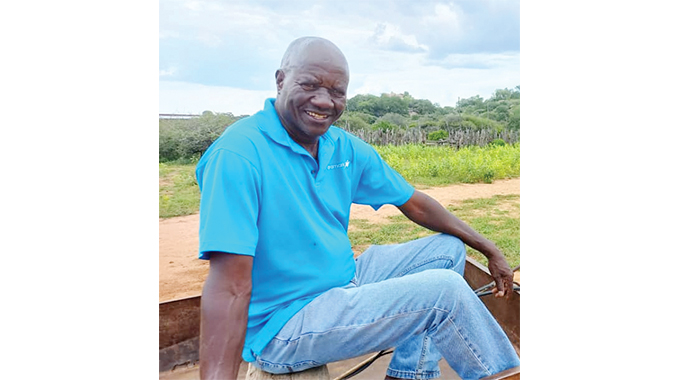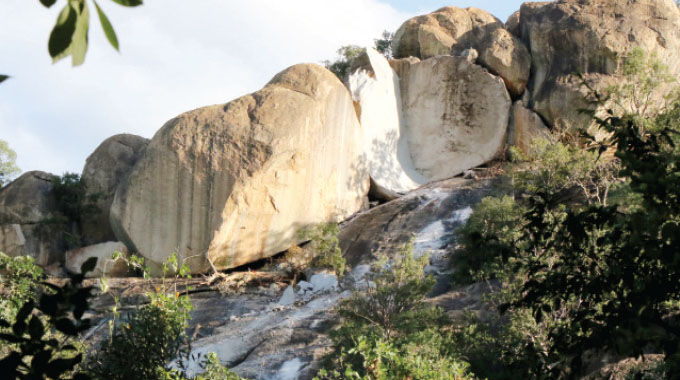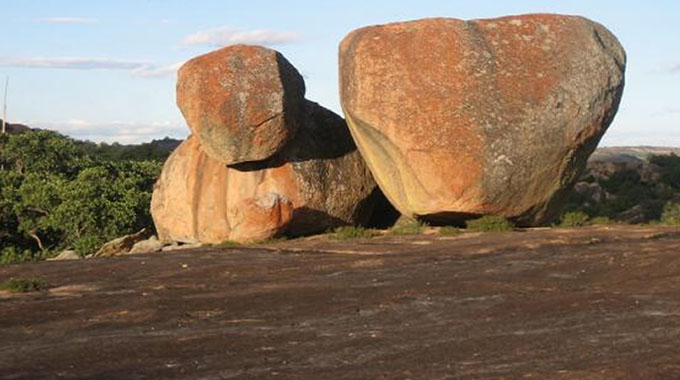Communities still uphold rain-making rituals

Sukulwenkosi Dube-Matutu, Matabeleland South Bureau Chief
SINCE time immemorial, people in the rural areas have set aside a day when they do not work in the fields.
Some communities observe Wednesday while others have set aside Thursday as the sacred day. On the day, villagers abstain from all field work as a way of respecting the ancestors and the god of the rain.
Some villagers still stick to this tradition while in some areas it has been overridden by Christian beliefs.
Culturally, the indigenous people in Zimbabwe while also venerating their ancestors, looked to a powerful deity known as Mwali or Mwari for rain, successful crops and the health of the land.

The split rock at the sacred Njelele Shrine in Matobo hills
The rain-making ceremony takes place annually at the Njelele Shrine in Matobo Hills, Matabeleland South where Mwali or Mwari is thought to reside. During the rain making ritual, spiritual pilgrims from various parts of the country and beyond would converge and still converge at the shrine.
The visit to Njelele is conducted around September.
Each village had representatives who were commonly known as “abadinda” who would go and converge at Njelele. They would take a long walk to the mountain which would last for some days.
Upon their return, they would perform some rituals to cleanse the community of evil spirits in order to pave way for the rains. Some of the rituals have been overtaken by modern practices and Christianity.
The Njelele Shrine is also visited for other purposes such as asking for forgiveness after society’s wrongdoings as well as asking for cures for human and domesticated animal diseases.
This visit to Njelele was accompanied by some rituals at community level. These cultural practices also stretch throughout the farming season. In a bid to uphold these rituals, some communities exempt themselves from field work on Wednesdays and others on Thursdays. No matter how demanding the work in the fields may be, some villagers have stuck to this tradition in order to appease ancestors and Mwali/Mwari.
Although Ms Salfina Sibanda from Fumugwe Village was still young at the time, she recalls some of rituals that were practised back in the day. Her father was one of the village elders that were selected to make the long trip to Njelele on behalf of the community.
She said on the day, those who remained behind were not supposed to do any work.

Ms Salfina Sibanda
“I remember that on the day that my father and other village elders went to Njelele, those who remained behind were not supposed to do any work or household chores. There was supposed to be silence in the community when the elders were going so that their journey would be peaceful. At the mountain, they would plead for good and calm rains.
“People were also supposed to abstain from any sexual activities during the time when the delegation had gone to Njelele. Elderly women would ululate and dance as a way of bidding farewell to the delegation and welcoming them back. While the rain-making suitors were away, the people that remained behind were supposed to dance and hunt,” she said.
Ms Sibanda said when the delegation was nearing the village from the shrine, they would sound a horn to alert the community of their arrival. She said upon arrival, they would congregate at a designated place near a river where people would dance to the beat of drums and singing. Ms Sibanda said children were not permitted to be part of this gathering. She said the elders would then visit each field in the area as part of a ritual to ensure each field would be fertile.

Mr Richard Nkomo
Ms Sibanda said usually, when the delegation was on its way from the mountain, they would receive some light showers.
Ms Sibanda said they knew that once the Njelele ceremony had been done, the rains would come soon after and people would start working in their fields.
She said some rituals were still being conducted in the community but they now involved children. Ms Sibanda said in the past, rain-makers used to walk to the shrine unlike today where some people make their trip to Njelele by car.
Another villager, Mr Jabulani Sibanda said at his homestead, they still uphold the tradition of abstaining from field work on Wednesdays. He said some religious groups in the area were, however, no longer practicing this tradition.

The Njelele Shrines
Mr Sibanda said some community members still observe the tradition as a way of appeasing the ancestors. He said the elders say that the message came from the ancestors for the day to be observed as sacred.
“While we observe this tradition, it’s difficult to instil it upon the youths as they are now inquisitive. For us, this tradition is important because it has helped us over the years to receive good rains. If you look at the situation nowadays, you will realise that we are now experiencing extreme weather conditions because our traditions have been compromised.
“While we observe the Wednesday tradition, a lot of the other rituals that were conducted have been abandoned. Back in the day, we knew that each visit to Njelele would give us good rains but the visits that are conducted nowadays are becoming a flop. It’s because traditions have been compromised. Back in the day, everything was done by the book with no shortcuts,” he said.
Mr Sibanda said only village elders from selected households were supposed to visit Njelele but today the selection process was random. He said their village had three elders that made the trip to Njelele.
Mr Sibanda said the trip to Njelele also helped to ensure that crops were not attacked by pests.
Manongwe Village head, Mr Richard Nkomo (80) said as part of the rain-making rituals, the community had to be cleansed of anything that could militate against the development of rain clouds. He said trees that had been struck by lightning in the previous rainy season were burnt.
Bird nests on trees were removed together with nestlings of certain birds which were believed to drive away developing rain clouds. Mr Nkomo said animal bones were collected and burnt together with nests and trees.
“Growing up, we knew that if we did not uphold the rain making rituals then we would not have a good farming season. Our crops used to perform very well. To show that this ritual was approved and acknowledged, we would receive slight rains on the last day of the rain making ceremony. People from as far as Mberengwa used to pass through our village on their way to Njelele.
“Before working in their fields, each household was supposed to take their seed to rain making suitors to be blessed. Before harvesting, first fruits were given to the rain making suitors as an offering,” he said – @DubeMatutu











Comments